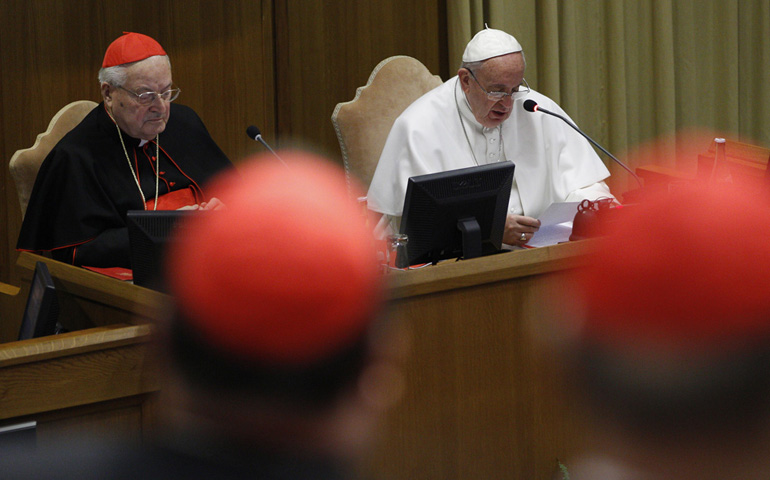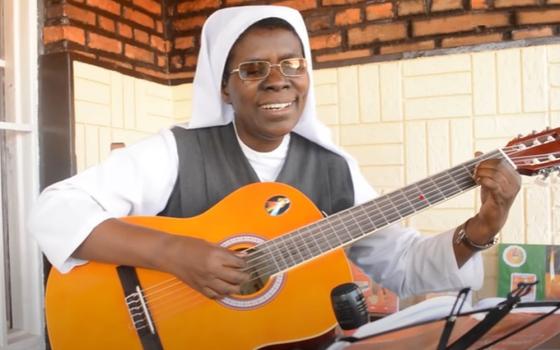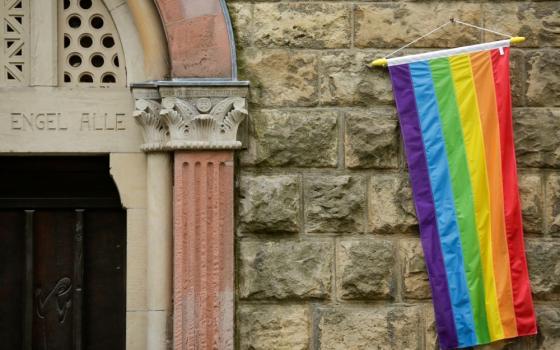
Pope Francis began a rare meeting with some 150 Catholic cardinals to discuss reform of the Vatican bureaucracy by calling on them to speak boldly and to keep in mind the "supreme law," which he called the "salvation of souls."
Opening what is known as a consistory, a closed-door meeting of the world's cardinals at the Vatican, the pope also called on the prelates to help him build "more effective collaboration" among church offices "in that absolute transparency that builds authentic synodality and collegiality."
Speaking of the reform process that he has undertaken over the past 18 months with a select group of nine cardinals, Francis said reform of the Vatican bureaucracy "is not an end in itself."
Reform of the bureaucracy, the pope said, is "but a means to give a strong Christian witness; to promote a more effective evangelization; to promote a more fruitful ecumenical spirit; to encourage a more constructive dialogue with all."
"Certainly, reaching such a goal is not easy: it requires time, determination and above all the cooperation of all," Francis said. "But to realize this we must rely above all on the Holy Spirit, which is the true guide of the church, imploring in prayer the gift of authentic discernment."
Using the Greek term parrhesia -- to speak candidly or boldly and without fear -- the pope told the cardinals their meeting would be "fruitful" if they spoke in such a way.
"With this spirit of collaboration begins our meeting, which will be fruitful thanks to the contribution that each of us can express with parrhesia, fidelity to the Magisterium and the knowledge that everything contributes to the supreme law, that is, the salvation of souls," the pope concluded.
The cardinals are meeting Thursday and Friday at the Vatican to discuss the process of reform, which seems to be languishing in debates over the purpose, scope and role of the church bureaucracy.
The nine-member Council of Cardinals appointed by Francis has primarily undertaken the reform, which the Vatican says may not be ready until 2016.
The cardinals' meetings this week are secret, with no access to their remarks or summaries of what they said. Vatican spokesman Jesuit Fr. Federico Lombardi instead hosted a press briefing Thursday afternoon summarizing some of the meeting's key themes.
The prelates opened their meeting Thursday with a talk from Honduran Cardinal Oscar Rodriguez Maradiaga, who is coordinating the work of the cardinals' council. Maradiaga's talk was then followed by remarks from Bishop Marcello Semeraro, an Italian who is serving as secretary to the cardinals' group.
Lombardi said Semeraro's talk had two major parts: one emphasizing the "principle spirituality" and "guiding lines" for Vatican reform, and the other proposing the creation of two new Vatican congregations -- one for issues of justice, peace and charity and the other dedicated to laity and family.
The Vatican bureaucracy is currently split between 12 councils and nine congregations. The congregations are normally considered more powerful, as they handle matters like church doctrine and appointment of bishops.
Talking about a possible new congregation for the laity, Lombardi said such a congregation "seems natural" according to the discussions of the Second Vatican Council as the Vatican has congregations for bishops, clergy and religious but not one for laypeople.
While Lombardi did not explain exactly how the two new congregations might be formed, he said the proposal for the new justice and charity congregation may involve giving the new office oversight over Vatican councils regarding health care, migrants and refugees, and safeguarding creation.
Asked if a new congregation for the laity might be led by a layperson, Lombardi said no.
"It is not realistically thinkable that a layperson might be named the head of a congregation," the spokesman said, saying that heads of congregations are normally cardinals.
Following Rodriguez and Semeraro's remarks, Lombardi said there was time for brief interventions Thursday morning by 12 other cardinals.
Among the themes in those interventions, the spokesman said: discussions on synodality and collegiality, collaboration and coordination between the different parts of the Curia, the function of the Vatican's secretary of state, and the turnover of personnel at the Vatican.
On the last subject, Lombardi said some cardinals suggesting having term limits on curial employees while others said it was important for such employees to have long experience in delicate issues.
Francis spoke Thursday morning for less than five minutes after leading the cardinals in morning prayer. The pope arrived about 30 minutes early to the meeting, before most of the cardinals, and stood at the front of the room, greeting many of the prelates as they entered.
On Saturday, Francis will name 20 new cardinals in a formal ceremony in St. Peter's Basilica.
One of those new cardinals seems to be firmly in the camp pushing for change in Vatican personnel. Wellington, New Zealand, Cardinal-designate John Dew told Vatican Radio he hoped curial officials could "know what it's like to work in a diocese and work with people."
"I often think that people in the Curia don't get this opportunity, you know they speak to other bishops day in day out," Dew said. "So where is their opportunity for real on the ground experience?"
"One hope is that people don't spend too long in a particular office, but that they can go home to their diocese to be really aware of what people have to deal with in life," he continued.
[Joshua J. McElwee is NCR Vatican correspondent. His email address is jmcelwee@ncronline.org. Follow him on Twitter: @joshjmac.]




